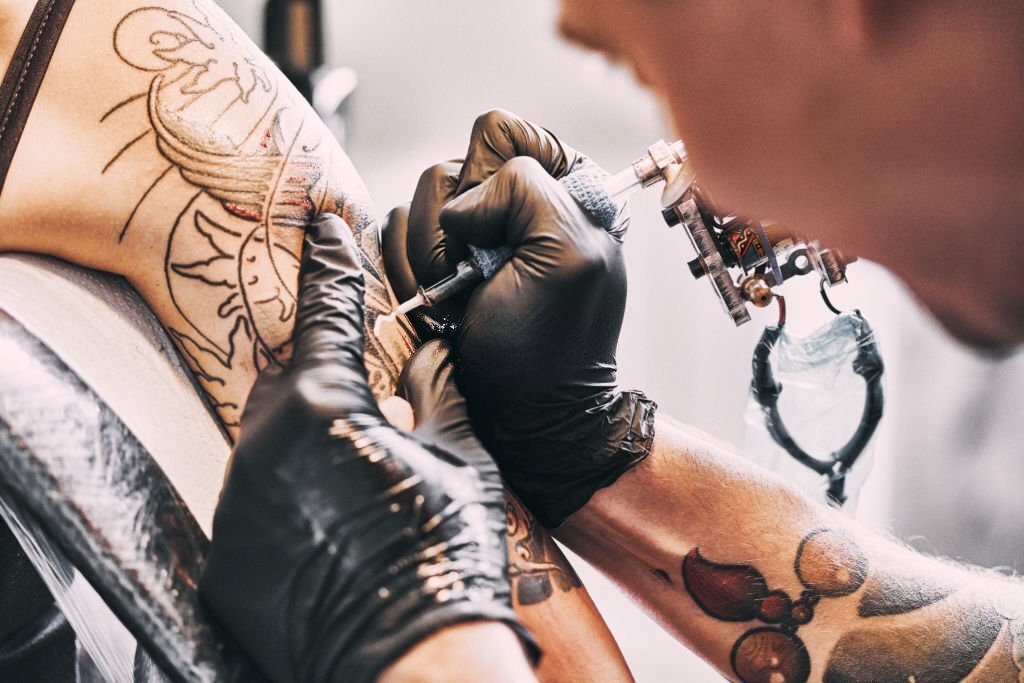Tattoos have become a popular form of self-expression, with millions of people around the world getting inked every year.
However, while the tattooing process is important, aftercare is just as crucial. Proper aftercare can ensure that your tattoo looks great and remains healthy for years to come.
In this ultimate guide, we will cover everything you need to know about tattoo aftercare, from immediate care after getting inked to long-term maintenance.
We will discuss the importance of proper tattoo care, and the healing process, and provide expert tips to help you avoid common mistakes.
By the end of this guide, you’ll be equipped with the knowledge you need to keep your tattoo looking its best.
Why Proper Tattoo Care Is Essential
Proper tattoo care is essential to ensure the health and longevity of your new ink. Ink is injected into the skin, resulting in an open wound that can lead to infections and other problems…
By taking proper care of your tattoo, you can prevent these issues and ensure that your tattoo heals correctly.
In addition to health concerns, lack of aftercare can also affect the appearance of your tattoo. Without proper care, your tattoo may become faded, blurry, or distorted, detracting from its beauty and meaning.
The healing process of a tattoo typically takes around 2-3 weeks, and it is important to understand what to expect during each stage.
During the first few days, your tattoo will be tender and sore, and you may experience redness and swelling around the tattooed area. You should avoid exposing your new tattoo to direct sunlight, and it is recommended to keep the area covered and clean.
In the following days, your tattoo will start to scab and peel as it begins to heal.
It is important not to pick at the scabs, as this can cause scarring and affect the final appearance of your tattoo. Instead, keep the area clean and moisturized with a gentle, unscented lotion.
After a few weeks, your tattoo should be fully healed, but it is important to continue taking proper care of it to prevent fading and other issues.
By following the tips and guidelines in this guide, you can ensure that your tattoo looks great and remains healthy for years to come.
Immediate Aftercare

Immediate aftercare is crucial for the proper healing of your new tattoo. When you leave the tattoo studio, your artist will have covered your new tattoo with a sterile bandage or wrap.
It is important to keep this bandage on for at least a few hours, or as directed by your artist, to prevent infections and protect your tattoo from outside elements.
Once you are ready to remove the bandage, it is important to wash your tattoo gently with lukewarm water and mild soap.
Avoid using hot water or harsh soaps, as these can irritate the tattooed area. After washing, pat the area dry with a clean towel and apply a thin layer of unscented lotion or ointment recommended by your artist.
During the initial healing phase, it is also important to choose clothing that won’t rub against or irritate your new tattoo.
Loose-fitting clothing is ideal, as it will allow your tattoo to breathe and heal properly. Avoid tight-fitting clothing, as well as materials that can stick to your tattoo, such as wool or synthetic fabrics.
It is also important to avoid certain activities during the initial healing phase.
For example, swimming or soaking your new tattoo in water can increase the risk of infection and prolong the healing process.
Direct sun exposure can also cause fading and damage to your tattoo, so it is important to keep it covered and out of the sun.
Additionally, picking at scabs or peeling skin can cause scarring and affect the final appearance of your tattoo, so it is important to resist the urge to scratch or pick at your new ink.
By following these tips and guidelines for immediate aftercare, you can ensure that your new tattoo heals properly and looks great for years to come.
Remember to always follow the advice of your tattoo artist and contact them if you have any concerns or questions about caring for your new tattoo.
Ongoing Tattoo Care
Proper ongoing tattoo care includes choosing the right products to use on your tattoo, including Tattoo Numb.
Tattoo Numb is a topical anesthetic cream that can help reduce the pain and discomfort associated with getting a tattoo, making the process more comfortable for you.
When choosing a Tattoo Numb cream, it’s important to select a high-quality product that is specifically formulated for tattoos.
Look for a cream that contains safe and effective ingredients, such as lidocaine, and follow the instructions carefully for proper application.
Tattoo Numb should only be applied to clean, dry skin prior to getting a tattoo. Be sure to follow the instructions carefully and apply the cream at least 30 minutes before your appointment.
Keep in mind that Tattoo Numb is not a substitute for proper aftercare, so be sure to continue caring for your tattoo properly after your appointment.
Using Tattoo Numb can make the tattoo process more comfortable and help you get through it with less pain and discomfort.
Just be sure to choose a high-quality product and follow the instructions carefully for the best results.

In addition to moisturizing, it is important to protect your tattoo from the sun. Direct sun exposure can cause fading and damage to your tattoo, so it is important to keep it covered and out of the sun as much as possible.
If you need to be in the sun, apply a broad-spectrum sunscreen with at least SPF 30 to your tattoo before going outside. Be sure to reapply the sunscreen every few hours or as needed.
If you notice any problems with your tattoo, it is important to take action as soon as possible. Infections can occur if your tattoo becomes irritated or exposed to germs.
Signs of an infection include redness, swelling, warmth, and pus or fluid coming from the tattooed area.
If you suspect that your tattoo is infected, contact your tattoo artist or healthcare provider immediately.
Fading can also occur over time, but there are steps you can take to minimize this risk. Avoid exposing your tattoo to direct sunlight, and keep it moisturized to prevent dryness and cracking.
If you notice that your tattoo is fading, consider visiting your artist for touch-ups or to discuss options for restoration.
By following these ongoing care tips and addressing any problems with your tattoo promptly, you can keep your tattoo looking great for years to come.
Remember to always follow the advice of your tattoo artist and to take care of your tattoo with the same care and attention you gave it when you first got it.
Long-Term Tattoo Care

Long-term tattoo care is all about maintaining the appearance of your tattoo over time. One key tip is to maintain a healthy weight, as significant weight gain or loss can cause your tattoo to stretch or warp.
Staying hydrated is also important, as it can help keep your skin healthy and prevent cracking or fading of your tattoo.
Another option to consider for long-term tattoo care is using Tattoo Numbing Cream like Tattoo Numb.
This can help reduce any pain or discomfort you may experience during touch-ups or other tattoo-related procedures.
As your skin ages, it is natural for tattoos to fade or lose their vibrancy. Sun exposure can also have a negative impact on tattoos, causing them to fade more quickly than they would otherwise.
To prevent this, it is important to limit your direct sun exposure and use sunscreen to protect your tattoo when you are outside.
If you notice significant fading or damage to your tattoo, touch-ups may be necessary.
Your tattoo artist can provide recommendations on when to schedule touch-ups and what to expect during the process. In some cases, you may also want to consider getting a new tattoo to replace an older one.
By following these long-term care tips and working with your tattoo artist as needed, you can keep your tattoo looking great for years to come.
Remember to always take care of your tattoo and give it the attention it deserves, and it will continue to be a source of pride and beauty for years to come.

Common Tattoo Care Mistakes
Unfortunately, many people make mistakes when it comes to caring for their tattoos.
These mistakes can have a negative impact on the appearance of the tattoo and even cause infections or other complications.
Here are some common tattoo care mistakes and how to avoid them:
- Not cleaning the tattoo properly: Proper cleaning is essential for preventing infections and ensuring proper healing. Use a mild, fragrance-free soap and warm water to gently clean the tattoo twice a day.
- Over-moisturizing: While it’s important to keep your tattoo moisturized, over-moisturizing can lead to a buildup of lotion that can clog your pores and prevent proper healing. Apply a thin layer of moisturizer 2-3 times a day.
- Wearing tight or restrictive clothing: Tight clothing can rub against the tattoo and cause irritation, which can lead to scabbing or fading. Wear loose, breathable clothing during the healing process.
- Picking at scabs: It’s normal for scabs to form over the tattoo as it heals, but picking at them can cause scarring or damage to the tattoo. Leave the scabs alone and let them fall off naturally.
- Exposing the tattoo to direct sunlight: Sun exposure can cause tattoos to fade or lose their vibrancy, so it’s important to keep your tattoo covered or use sunscreen when you’re outside.
By avoiding these common tattoo care mistakes and following proper aftercare instructions, you can ensure that your tattoo heals properly and looks great for years to come.
Conclusion
In conclusion, proper tattoo care is essential for ensuring the longevity and appearance of your tattoo.
By following the steps outlined in this guide, including immediate aftercare, ongoing care, and long-term care, you can help your tattoo heal properly and look great for years to come.
It’s important to avoid common mistakes such as over-moisturizing, wearing tight clothing, and exposing your tattoo to direct sunlight.
And if you notice any issues with your tattoo, such as signs of infection or fading, seek professional help right away.
With proper care and attention, your tattoo can be a beautiful and meaningful part of your life for years to come.








![How To Get A Ring Off a Swollen Finger [Update] How To Get A Ring Off a Swollen Finger](https://www.shopplax.com/wp-content/uploads/2024/01/How-to-get-a-ring-off-218x150.webp)



